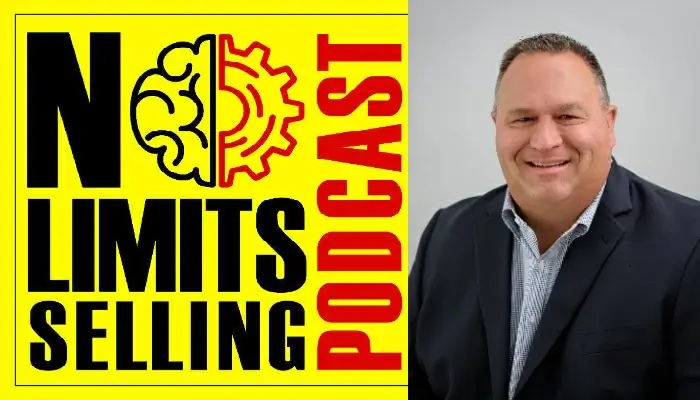Tom Hoelderle's Game-Changing Strategies On How A Better Sales Process Increases Your Business Growth
On Episode 230 of The No Limits Selling Podcast, we have Tom Hoelderle, MBA, "The Sales Fixer" | Outsourced VP of Sales | Breakthrough Sales Growth | Strategy | Process | Execution | Leadership.
He is a sales leader with 30 years of expertise in improving actions that impact profitability. Adept at identifying organizational risk and cost reductions and facilitating strategic sales planning. He is committed to driving exponential business growth and motivating people through dynamic strategy, execution, relationship management, and leadership. He has experience building rapport with multi-state private equity, public and global businesses, sales teams, and finance to drive market awareness and generate leads. He can strengthen relationships with clients and influence decisions with C-Suite leaders. He's a trusted advisor who delivers solutions. He specializes in B2B consultative selling and business development.
Contact Tom:
[EDITOR’S NOTE: This podcast is sponsored by No Limits Selling. It is a fun, fast-paced podcast that delivers hard-fought business advice that you can implement today to improve your sales and performance]
Interested In Our Real Estate Coaching Services? Explore Our Website: Link
Feeling Not Well Today? You Can Use Our Mindset Boosters App To amp Up Your Mood: Link
Find us on Social Media:
LinkedIn | Facebook community | Instagram
Like what do you listen to? Subscribe to our podcast!
Ready to become fearless? We can help you become fearless in 60 days so you accomplish more in your career Schedule A 15 min Call with Umar
Summary
Tom Hoelderle: The Sales Maestro
In the bustling world of business, where the survival of the fittest is the rule of the game, there are a few who stand out, not just for their ability to thrive but for their capacity to uplift others. Tom Hoelderle, a seasoned business consultant and coach, is one such individual who has made it his mission to help businesses grow. His expertise lies in the realm of sales and marketing, where he has been instrumental in transforming companies by helping them overcome challenges and achieve their goals.
A Journey of Learning and Leadership
Tom's journey in the world of sales and marketing is nothing short of inspiring. His humble beginnings in a small company, where he learned the ropes of sales, laid the foundation for his illustrious career. As he moved up the ladder, he found himself at the helm of a sales team in a larger company, navigating the complexities of leadership and team management. His experience spans across a diverse range of industries, from technology and healthcare to manufacturing, making him a versatile player in the business arena.
The Hoelderle Approach to Sales & Business Growth
Tom's approach to sales is a refreshing blend of empathy and strategy. He firmly believes in the power of understanding the customer's needs and delivering solutions that not only meet but exceed those needs. His philosophy is centered around building strong, lasting relationships with customers, a strategy that has proven successful time and again. He encourages salespeople to strive for excellence, not just in their sales numbers but in the quality of their interactions with customers.
Guiding Businesses to Success & Growth
Tom's advice for businesses is simple yet profound. He urges companies to focus on their strengths and to be in a constant state of improvement. In his view, complacency is the enemy of growth. He also emphasizes the importance of having a clear vision and a strong team. These are the pillars that support a successful business, according to Tom. His insights are not just theoretical but are backed by years of practical experience, making them invaluable for businesses seeking growth and success.
Conclusion: A Beacon of Guidance
Tom Hoelderle is more than just a business consultant; he is a beacon of guidance for companies navigating the turbulent waters of the business world. His wealth of experience, coupled with his unique approach to sales and marketing, makes him an invaluable asset for any business. For those seeking to learn from his insights or to avail of his consultation services, Tom extends an open invitation. His journey and his insights serve as a testament to his commitment to helping businesses grow and thrive.
Questions & Answers
Who is Tom Hoelderle?
What advice does Tom Hoelderle give to businesses?
How did Tom Hoelderle start his career in sales and marketing?
In which industries has Tom Hoelderle worked?
What is Tom Hoelderle's philosophy on customer relationships?
What does Tom Hoelderle believe is the enemy of business growth?
What are the key pillars of a successful business, according to Tom Hoelderle?
Don’t miss this opportunity to transform your real estate career with one-on-one coaching. As an experienced real estate coach, I, Umar Hameed, am dedicated to helping you unlock your full potential and achieve your real estate goals. To learn more about who am I and my clients ↓
If you’re ready to take the next step, book an appointment with me today and begin your journey toward success in the real estate industry.


